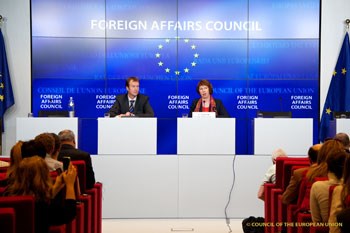As stressed by Minister Pusić, Croatia feels that increasing sanctions against Syria must be implemented together with an exit strategy for the current Syrian regime
As stressed by Minister Pusić, Croatia feels that increasing sanctions against Syria must be implemented together with an exit strategy for the current Syrian regime.
The election of the new Egyptian president was welcomed by all participants of the meeting. The Croatian minister emphasized that the election of the new Egyptian president is an important step in the democratic transition of Egypt, adding that Egypt “is facing reforms of the old and building of new institutions in which the European Union can play a very important role”. She stressed that the procedures and techniques learned through the process of enlargement and the accession process are also applicable to the case of Egypt and the remaining countries of the southern Mediterranean, and she was pleased to note that the Egyptian Foreign Minister and his colleagues from the region have confirmed their attendance at the upcoming Croatian Summit. “Egypt is a country that has a critical influence on the remaining countries in its region, and we hope that that in its democratic transition process, it will guarantee equality for all citizens, regardless of their ethnic, religious, gender or any other affiliation,” stated Minister Pusić.
With regard to Bosnia and Herzegovina, Minister Pusić stressed that Croatia sees two aspects to its progress: achieving political agreement and implementation of that agreement. It is difficult to achieve agreement in Bosnia and Herzegovina, though the state budget was recently passed and all the relevant political representatives agree on the need for BiH's European integration. The Croatian minister outlined the facts that two processes – integration into the EU and integration into NATO – are very closely related in BiH.
The morning part of the Council meeting ended with the adoption of a strategic framework for human rights and democracy and an action plan, which Croatia deems very important and supports the establishment of a Human Rights Foundation, as proposed by Polish Foreign Minister Radosław Sikorski. Minister Pusić stressed that “Croatia believes that the quality of human rights should be viewed through the quality of the rights of women and girls, as this is, in a way, a litmus test of the state of the humans rights in a country”. A proposal to appoint a special commissioner for human rights was made and supported at the meeting.
Prior to the Foreign Affairs Council meeting, Minister Pusić participated in the informal minister's meeting on Moldova. The minister stated that Croatia is willing to offer its experiences through the Centre of Excellence and she expressed her satisfaction that the Deputy Premier and Foreign Affairs Minister of Moldova would be attending the upcoming Croatia Summit. The building of institutions, the rule of law, battling corruption and organised crime are all key for the development of a democratic society, and the experienced attained in the negotiations process can contribute towards achieving these.
The Minister also held several bilateral meetings, including meetings with Swedish Foreign Minister Carl Bildt, Dutch Foreign Minister Uri Rosenthal and Slovenian Foreign Minister Karko Erjavec.
Press releases


